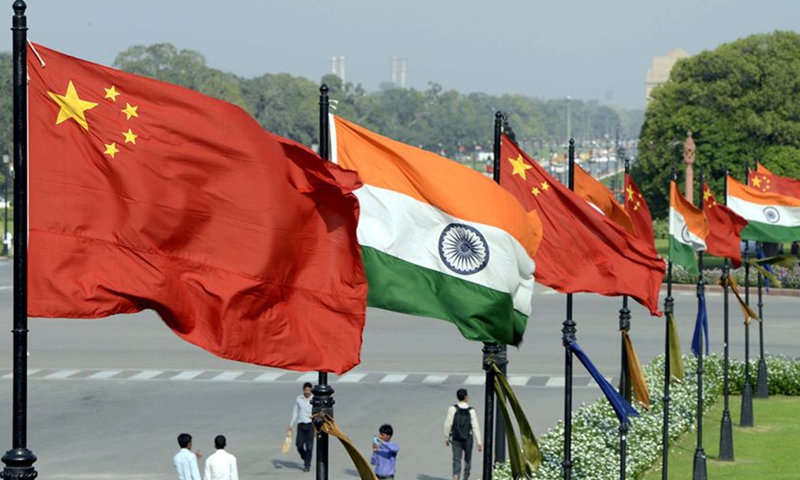China, India agree to disengage frontline border troops: source
By Guo Yuandan Source:Global Times Published: 2020/7/1 21:17:13
Positive sign of tensions cooling down, takes time to carry out: experts

Photo: Xinhua
China and India have agreed to disengage front-line border troops in batches and take effective measures to ease the situation in the border areas, a source close to Chinese border troops told the Global Times on Wednesday.
The source said Chinese and Indian border troops held a third round of military commander-level talks on Tuesday. The two sides had a frank and in-depth exchange of views, discussed effective ways to resolve current differences in border control, and studied concrete measures to enhance mutual trust and maintain stability.
The two sides have agreed to disengage frontline troops in batches and take effective measures to ease the situation in the border areas. The source said that the military commander-level's meeting showed the two sides' willingness to ease tensions on the border, and avoid further escalating the situation.
The two sides should make use of the existing border talk mechanism, abide by agreements, respect historical facts, accommodate each other's core concerns, and push for the implementation of the consensus reached through negotiations, the source said.
What is urgent now is that India should meet China halfway, strictly restrain the actions of frontline troops, refrain from taking radical moves and risks, and jointly safeguard peace and tranquility in the China-India border areas, the source stressed.
Qian Feng, director of the research department of the National Strategy Institute at Tsinghua University in Beijing, told the Global Times that this is a positive sign, showing that the tension between the two side is easing in the wake of a bloody clash on June 15.
The Hindustan Times reported on Tuesday that the Indian Army has deployed six T-90 missile firing tanks and top-of-the-line shoulder-fired anti-tank missile systems in the Galwan Valley sector.
Chinese Foreign Ministry spokesperson Zhao Lijian said at Wednesday's routine press briefing that China and India have made active progress in pushing for effective measures to disengage frontline border troops and ease the situation on the border areas at the third round of military commander-level talks on Tuesday.
Qian said that both sides held a second round of talks between army commanders soon after the clash on June 15, which failed to assuage the tension, and India has increased its military presence at the border.
As the Galwan Valley sector is a narrow space, the presence of so many troops signals that the tension has escalated. The third talks, which propelled both sides to reach a consensus to disengage their frontline border troops in batches, means that the two armies are engaged ina process to resolve their differences via peaceful talks and de-escalate the current tension, said Qian.
During the first round of talks between army commanders, the two sides had negotiated to disengage their troops in batches, but the consensus was broken by the June 15 accident.
Qian said that after confrontations, high-level officials in China and India have always been keen to contain tensions and maintain peace in the border regions, which is also why the two have planned their first army commander-level talks in many years.
In addition, weather is a factor that needs to be taken into consideration, said Qian. The area, which is 5,000 kilometers above sea level, becomes uninhabitable after September, so it is unrealistic for personnel from both sides to be stationed there for the long run. Under such circumstances, commanders all wish to resolve the issue as soon as possible, he noted.
China welcomes the progress and hopes that India could take concrete actions to implement the consensus reached by the two sides, and maintain close contact with the Chinese side through military and diplomatic channels to de-escalate border tensions, Zhao said.
Asked whether the June 15 accident will recur, Qian said that this is why China has repeatedly asked India to manage its front-line troops to avoid such accidents, which is unwanted by both sides.
Once history repeats itself, it will surely add fuel to the fire, said Qian, urging the Indian side to strict forbid its army from crossing the border and manage its construction activities.
He believes from military perspective, it will take time for both sides to disengage their front-line troops in batches. For one, both sides need time to see if the other is obeying the consensus, and then withdraw its increased troops accordingly to bring peace to the border region.
On the other hand, troops and weapons have been stationed in this area in batches for the past month; it also takes time for them to withdraw.
Newspaper headline: China, India to disengage border troops
RELATED ARTICLES:
Posted in: DIPLOMACY